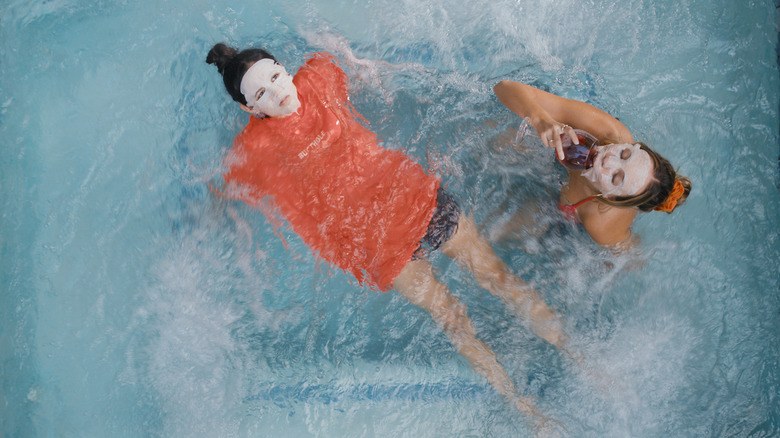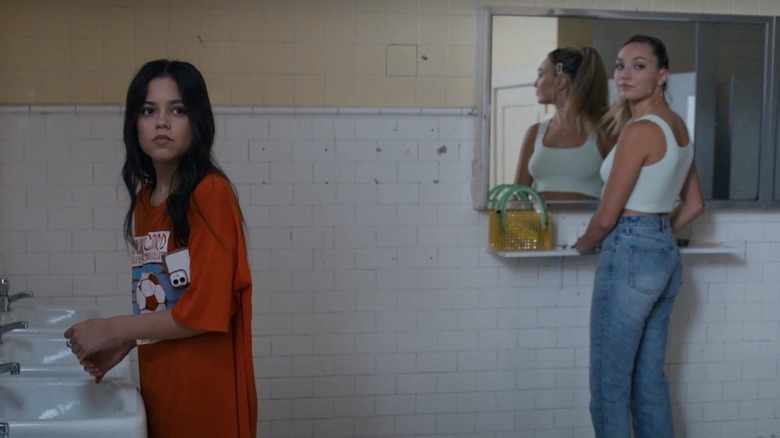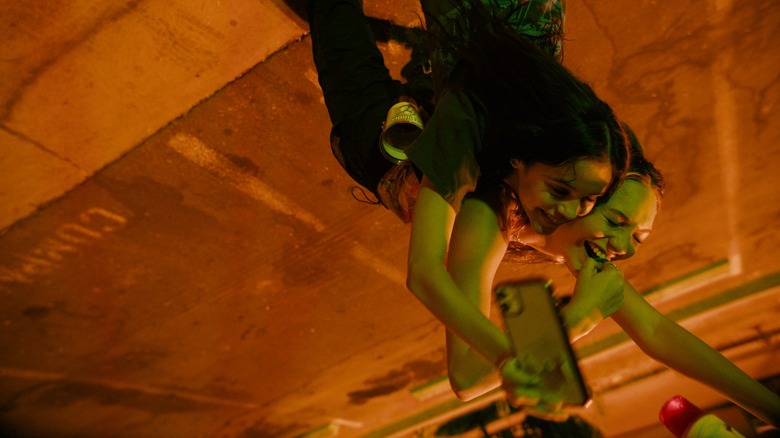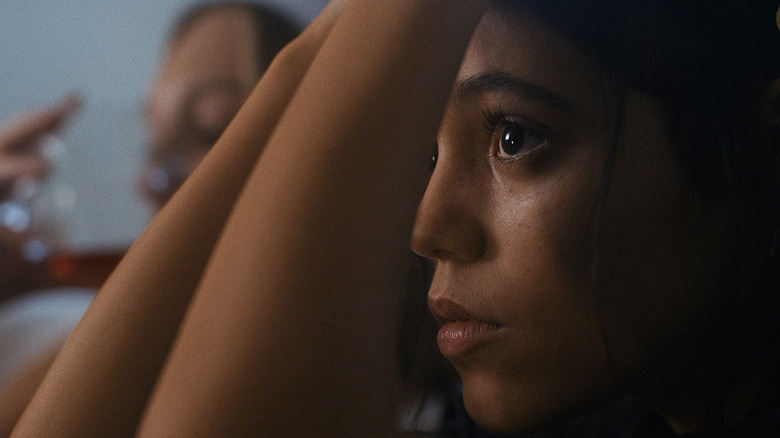The Fallout Director Megan Park On The Importance Of Little Details, Adding Levity To A Traumatic Story, And More [Interview]
"The Fallout" is an exceptional debut film. Its understated compassion, natural dialog about school shootings and PTSD, and intensity combined with the mundanity of coming of age, all make for a poignant drama. There's nothing calculated about the naturalism crafted by writer and director Megan Park, who was influenced by filmmakers such as Sean Baker, Mélanie Laurent, and Sofia Coppola.
Park, who began her career as an actress, was always striving for purity. "I was just trying to do my version of the coming of age story and make it as authentic as I possibly could," she told us. "That was my north star the entire time when I was making it." The actor-turned-filmmaker strikes a strong chord with "The Fallout," which stars Jenna Ortega as a survivor of a school shooting.
Recently, Park talked to us about Ortega's genuine performance, how she edited the film in four weeks, and her vision for the film.
"Have it come from the heart."
Where did this story start for you?
Truthfully, it was such an emotional decision. I genuinely could not stop thinking about what it would be to be a high school student right now in America. I am a little bit older and I grew up in Canada, so I just didn't feel that fear going to school every day. I just continued to be gut punched every time I would see another one of these things happen. I wanted to try to tell a different side, a more compassionate, more empathetic take on the people who are left to deal with the trauma of this without making it feel it had some political agenda or was polarizing. Have it come from the heart.
What questions were you asking yourself when you were writing it?
I had obviously read a lot of horrific stories, people recounting being through something like this. I do not know if it was because I come from the acting side, but part of what you do as an actor is use your imagination. Obviously, a lot of times when you are acting, but you do your research and you get into the heart of it.
For me, when I was writing it, I was trying to figure out how I would feel. It was a combination of my imagination and doing some research and trying to figure out what that might look like for the average kid. I think we've all dealt with grief and some degree of traumatic events. It was pulling on that as well, because I hope that the movie relates to anyone who's gone through any kind of trauma or grief. Obviously, a lot of people will have gone through shootings, but I think anybody who's felt any loss will relate.
The scene between her and her father towards the end, too, I think a lot of people will feel that moment. That's fairly universal.
A lot of people really responded to that scene, I think for the same reason. When I wrote this movie, I didn't have a kid. Then when I made the movie, I had a brand new baby and it was interesting, even filming that scene. I saw the perspective for the first time, so it changed for me from the parents as well. It was the fear they feel every day, just worried about their kids out and about in life, but specifically at school. It definitely changed my perspective.
How was it finding the tone? There are still the funny moments that come with being a teenager, like getting high by the pool.
That is the thing about making a movie about trauma is, I do not want to sit and watch the darkest story for two hours. It is depressing and trauma is not linear and grief is not linear. There are moments where you can not get out of bed, and that is in the movie too. But there are also moments of levity and then you feel a little guilty for having those moments. It is such a journey. I wanted the film to fully reflect that because it is not one dimensional and they are teenagers and life is slowly returning to a new normal.
Just before I watched your film, I read an interview with Gus Van Sant talking about "Elephant." He said he didn't want to try to give an answer for why this happens, because there is no satisfying answer. Did you feel similarly?
A hundred percent. I feel a lot of people have asked me about the ending of this movie because it is hard to not want to wrap things up neatly with a bow. I felt especially with this subject matter, there was only one way for me ever to end the movie, that you had to see that this is not a problem of the past. This is a problem of right now, we are living in this. It was important for me to leave people with that feeling. Although I hope that there are people who feel hope for Veda and specifically these characters, and that they will eventually find a pathway to understanding and living with their trauma and grief, I think you can not wrap a movie this up with a bow. That would feel wrong.
Was that the original ending you wrote? Were you always building towards it?
Always, yeah. As you know, films change so much in the process, depending on the locations, the actors, in the edit, and what you got and what you did not get. But there were two scenes that never changed for me from when I wrote them in any way. The bathroom stall scene, it was important to me that we stayed in that bathroom stall and we did not show anything outside of that stall, even when people were giving me notes otherwise.
It was also very important for me to end the movie in the way that we did. Although there were tons of sound design discussions, we actually did film all of Veda's panic attack at the end, so we had that on camera. We ended up just pulling the audio from and only seeing a brief second, which we felt was more powerful and less triggering. There were slightly different iterations of those moments, but they are exactly verbatim for how they were in the script.
"I did not want to see 27-year-olds as high school students for this movie."
Like you said, locations change and there are all these factors, but the darkness behind her in the final shot is fitting. Was that the sky you wanted for that shot?
Well, actually when we were shooting the movie, there were fires in L.A. The sky was naturally overcast, but we actually ended up there. There was this weird gray cloud. We pulled that and cheated it, and had that as the final frame. Yeah, that was an intentional shot.
So those two scenes you mentioned went unchanged. But what did change?
It is pretty close to the script, but there were moments — for instance, the scene where the little sisters are doing TikToks. That originally wasn't in the background, but she had shown me some of her TikTok videos. I thought that was such a great opportunity to show the distance they both had mentally at that moment. It was such a great reflection of that sort of generation, so I ended up throwing her in the background of that shot, having her do those TikToks pretty last minute.
Also, the therapy scenes. Shay had just read the script as a friend of mine, Shailene Woodley. She was like, "I want to play the therapist," and we did not even have a name for that character. It was a smaller role. I think there might have only been one therapy scene. We beefed it up a little bit, and it was great because I think those scenes ended up being powerful and some of my favorite scenes in the whole film.
We were also shooting in the middle of Covid, so we could not have extras and a lot of scenes you would have loved to have extras in. We had to be very careful — we could not shoot at night except for one [time] because of Covid. There was a lot of adjusting.
What about the shot of Jenna tripping in school? The low-angle shot of her moving in slow-motion is great.
Incredible, because Jenna was making me laugh. I mean, she can do everything. She blew me away in that scene.
What qualities made you cast her?
I love when people can find actors that just naturally embody the characters so much. I think Jenna not only is an incredible actress and can play anything, she naturally just embodies the energy of Veda. She really was that age, and that was important to me. I did not want to see 27-year-olds as high school students for this movie.
She just had that special intangible quality. Honestly, we just got together and she read the script and she loved it and we had coffee and we just talked about our lives. And then we talked about the script and about Veda and I knew immediately. She did not even read or audition for the part. I knew she was Veda. It was instantaneous. I can't wait for the world to see her performance in this.
She is just unbelievable. She can do anything. She really can. We were on a super tight schedule. It was so low budget. We had such a short shoot and Jenna would — every frame of her performance was usable. We would always do Jenna "fun runs" where she could just do whatever she wanted and throw everything out of the window. A lot of those Jenna "fun runs" ended up in the movie.
With your background as an actor, how is it editing a performance such as hers?
Well, this is my first time in the editing room. I learned a lot. Also, we had four or five weeks to edit the movie, which is psychotic. That is not heard of really. I had a genius editor, Jennifer Lee, who I could not have done this without. She guided me. I learned so much about being a director, being in the edit, probably more than I even learned on set. It was educational.
I have been working in front of the camera since I was 15 and very quickly I can pick up on what people need from me, and everybody needs something different. That was really helpful, especially on such a tight schedule and it was Covid. We did not have in-person rehearsals with anybody before. No chemistry reads. It was just not happening. It was imperative for me to quickly pick up on what everybody needed. In the edit, I just knew what I wanted. I think I got lucky that I had such incredible performances to begin with. It was an easy edit for that purpose.
"The little details are everything."
What do you think Jenna needed on the set?
Jenna needed somebody to be her hype girl, to trust her and to give her space because she came so prepared and she nailed, I kid you not, every single take. From the emotional stuff to the fun stuff to the physical stuff, she nailed it every single time. Maybe I don't know if this is true, but I feel myself as a young actor, you don't always get the space to have the director be like, "That was amazing. You killed it. Now, do something that you have never tried before. Just throw it all away and try something fun." I would always just try to give her that opportunity because she is obviously so gifted. She is pretty magical, but give her the space to just let her do her thing.
Even the texts in this movie are very authentic. I didn't know what half of them meant.
[Laughs] Yeah. I remember when they were sending back some of the comps of the VFX of texting, I was like, "No, no!" It was proper grammar, proper spelling. The little details are everything. What's in their Instagram bio? What jewelry are they wearing, their wardrobe, their makeup, what is their slang that they're using? The memes that they're sending to each other? I think all of that was important because young people have high bullsh*t radars, and I love that. I think sometimes it can be one thing that can turn kids off and feel like it's an old person looking in, being like, "Look how crazy these young people are." I wanted to feel it was an authentic look into their world and didn't turn them off.
Why did you only have four or five weeks to edit?
Budget. It was a low, low budget movie. Not a lot of time, not a lot of money. I mean, that's the whole thing. If you are doing a Marvel movie, you have a lot of time, a lot of money, but we did not have a lot of time. We really didn't have a lot of money. It was tough.
When you started out acting, was directing an ambition?
Just recently, honestly. I feel acting was all I ever knew. Some people have asked me, "Why did you make the transition?" I come from a small town and no one in my family is in the industry. When you are interested in arts when you are younger, the natural thing is you go to a theater camp or you go to a small theater company. And so, I kind of just did that and I really enjoyed it.
Then I started working professionally in Toronto, the older I got, and then I got this TV show. It kind of happened. I just never thought about writing and directing as a current option for whatever reason. I just thought that was it. I think at one point I realized that acting was not fulfilling me personally in a way that it seemed to [for] my peers. When they would talk about how it would feel for them to be acting, I was like, "It just does not feel like that for me." I don't know why.
I remember the first time I wrote something, I was like, "Oh, this is all clicking for me in a way that being on the other side of the camera didn't quite click for me." Then when I directed, I felt the same way. I feel I would not have gone to film school. I grew up in a house without a TV. I was not a film buff, but that was such an education for me in a masterclass. There are so many years of acting that helped me.
Where do you want to go after "The Fallout" then?
It has changed a lot. I think the one thing I'm sure of is I'm never going to act in my own movie. That sounds like my version of a nightmare. Acting is always something that has been really fun for me and I've enjoyed, but I want to spend the majority of my time writing and directing. That is what really fulfills me.
Are you writing anything at the moment?
I have about four things I'm writing. I get very busy. I just finished writing my second feature that I am going to be making — knock on wood — this year, which I'm excited about. Also, I have a TV show that I'm writing and directing and another feature that I'm writing.
Now that you've made a movie, how do you write differently?
When I write, I just black out. I literally just don't know what's happening. I try not to get too in my head about it in terms of overthinking. Is this going to be an expensive scene to shoot? Is this going to be too hard? I just try to write from my gut and then figure out the rest later. I think that as I'm changing as a person and learning and evolving, my characters, my scripts are as well.
I think that I will definitely approach directing with a whole new skill set that is going to be valuable to me. We also directed "The Fallout" in the middle of the pandemic, pre-vaccine, pre-everything. I was breastfeeding a baby. I had a newborn at home. It was hard. I am looking forward to hopefully filming a movie without some of those things adding to the complication of it all. It will be easier, but there are always challenges. With every project, you just have to take them as they go.
"The Fallout" is now available on HBO Max.



